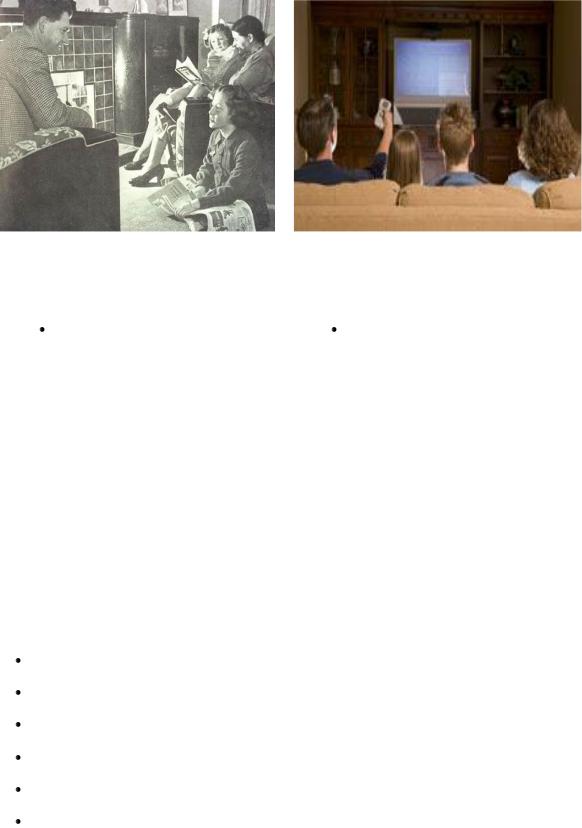
Basic English _Fisrt year_Булатова -31-10-11
.pdf
Reading: Family rules
7. Read the following answers about rules from the Internet forum
Question: What were your family rules when you were growing up and what did those rules teach you?
 Assyl
Assyl
Best Answer - Chosen by Asker: Everything was about respect. I respected my little
sisters I treated them nicely. I respected my parents and did what they asked. I
respected our house - I tidied my room. I respected myself – I cleaned myself and my
clothes regularly. The most important thing was respect for others, my environment,
and me. Now I show respect for the earth, I respect those who are less fortunate than I
am.
 Madina
Madina
No sitting on bed! We cleaned the house and left the room when adult talked. Respect
for myself and my siblings. In spite of inter sibling battles, we learned to listen to
each other, respect each other‘s opinions, and learn cooperation.
Zhazira
Every morning before me and my brother walked out the door to go to school my Dad asked: "Did you brush your teeth? You better go do it! You don't want all the kids to think you have unpleasant breath?"
To this day, I CANNOT leave the house without brushing my teeth. I have only one cavity in my whole life, and my teeth are very white still!
Kanat
Pick up after yourself, if it‘s not yours don't touch it, treat others as you wish to be treated, cheaters never prosper, respect your elders. These rules taught me to be clean about myself, respect other people, and treat all people as friends. I respect those older than me and listen to what they say, do something good for anyone. They all seem to work for me.
61

 Nazerke
Nazerke
We never had a lot of rules because the household I grew up in was totally dysfunctional. My mother was over protective. So the called her when I went somewhere to let her know that I got there alive and safe.
Cookie
There were many rules, but there is one I would like to focus on. My mother was always telling us to wash our hands. It's interesting that in this day age physicians warn our society of the importance of washing our hands and how much danger of disease there is if we do not. The world should always listen to mothers!
Talgat
I was taught that you can depend only on yourself. Nothing in life is free you have to work very hard to have the things you want. I wasn't close to my mother when I was younger, but now I realize that we only have one mother and one father, we need to cherish them and love them. When we get older, we realize that more and more.
8. Answer the questions. Sometimes more than two people can be chosen.
Which person:
thinks that we understand parents better when we grow up? feels that it is important to value parents?
mentions parts of body?
did not share secrets with Mom? had no rules in the family?
had a parent with a good sense of humour? had arguments with sisters and brothers? mentioned respect to the Earth? mentioned respect to the elders?
Speaking
9.Read the sentences. Are the sentences true about you? Your partner? Your teacher?
The rules of our house were very strict.
Our parents did a daily ‗inspection‘ of our rooms.
Doing well in school was very important. We often got a lecture from my parents.
We were taught to love and respect our siblings. We learned to share what we had with our siblings.
62
 I have no better friends than my brothers and sisters.
I have no better friends than my brothers and sisters.
Listening: Growing up with Rules
10.You are going to listen to the text “Growing up with Rules”. What is it going to be about?
Write down 6 words you expect to meet in the text.
1) ____________ |
4) |
____________ |
2) ____________ |
5) ____________ |
|
3) ____________ |
6) |
_____________ |
Compare your words with the words of other students in your class.
11.Listen to the text and see how many of the words you could guess. Complete the sentence.
The |
speaker |
says |
that |
having |
strict |
rules |
in |
the |
family |
_______________________
__________________________________________________________________
___.
12.Read the following responsibilities and tick |
the ones the speaker |
mentions.
1)We kept our rooms clean.
2)We washed the floors before school.
3)We reported the events of the day every evening.
4)We helped our mother every day.
5)We did a ‗daily‘ inspection of the rooms of our sisters and brothers.
6)We helped each other with our home task.
7)We got only good marks.
8)We respected our siblings.
Speaking
13.How was your parents‟ childhood different from yours? Write down a list of the characteristics of twentieth century childhood and then describe our own.
63

Then |
Now |
____________ |
________________ |
_____________ |
________________ |
_____________ |
_________________ |
How did the life for children changed over the last century and a half?
Writing: A short story
14.Read the following tips. Writing stories is fun but there are a few things that you think about before you start writing.
Setting: Where does it take place? When does it take place?
Where: |
|
|
When: |
-a big city |
-In the past, present or future |
||
-Japan, the U.S.A etc |
-During a birthday party |
||
-in the sea |
-During a holiday |
||
Characters: How do they/he/she feel? How old are they is he/she?
Feelings: Sad, happy, nervous, excited, sick, tired, athletic etc
Appearance: Fat, skinny, short, tall, handsome, cute, ugly, casual etc
Conflict / problem: Caught cheating/Fell in the water / Broke something/Forgot
homework
Development of the story: Went to see a doctor/went to the principal/Was/were
punished
Solution of the Problem: Had regret and talked it over/Got medicine/Made promises
End of the story: A story usually has a happy ending. Decide for yourself and remember….never cut off a story and leave it unfinished.
Checklist when you‟ve finished your story:
1.Do all the sentences begin with a capital letter?
2.Did you put commas, full stops, question marks and exclamation marks in the story?
64
3.Are you sure that there are no words missing?
4.Did you use the correct tense throughout the story?
5.Are there adjectives and adverbs to describe people/things?
Use some of these sentence starters: A couple of hours/minutes later, after awhile, suddenly, just then, almost immediately, the next morning/day, eventually, at ….o‘ clock, finally
15. Write a short story about your childhood.
Communication
16.Read the text. Use a dictionary to help you
Childhood then and now
When I was a little kid, my parents pushed me out the front door every day. Oftentimes, my 3 year old brother was sent out with me. Of course, I considered this a great obligation. After all, at five I was old enough to hang out with babies. Still, I had to take care of him because I was an older sister.
When we got a good group together, we played baseball or kickball in the street. Yes, in the street. When the cars rounded the corner, we ran away as fast as we could. Nobody cared.
We didn‘t have helmets or kneepads or elbow pads. It didn‘t matter. Sometimes we fell and rub the skin completely off of our bodies. Nobody cared.
We ate berries and apples from strange trees. And we survived. No, we didn‘t just survive. We flourished. Nobody was overweight; we all had little muscles popping out here and there. We were brave, too.
Unfortunately, things have changed. Children do not have the confidence and capability I had when I was 5. Kids aren‘t normal! They have no childhood anymore.
They have self esteem, but no actual actions.
17.Answer the questions.
What does the writer think about her childhood? Does she like it? Why? Why not? What does she think about children and childhood in the XXI century?
65
Do you agree with her? Why? Why not?
18.Have a class discussion talking about the ideas you strongly agree or strongly disagree with.
Independent assignment
1.Write a paragraph agreeing or disagreeing with the statement below.
It is more interesting to be a child today than 20 years ago.
2.Think on the following topic. Prepare a one minute speech.
How will you treat your own children? What will you let them do? What won‘t you let them do? What will they have to do? How will you make your child obey your rules?
3.Write a short paragraph comparing childhoods of the two centuries. Describe the differences between the two time periods.
4.Research (in books or on the Web) differences in clothing for boys and girls, making posters with drawings or illustrations of 19th century clothes.
5.What were you like as a person when you were four, nine, and eleven? Are you similar or quite different to how you are now? Write a paragraph.
Unit two |
Family |
Lesson three |
Generation gap |
Speaking |
|
1. Compare the people and society before and now.
66

People before |
People nowadays |
|
|
People in the past watched less TV. |
People nowadays prefer TV to talking. |
|
|
|
|
2.Answer the following questions:
Do you ever disagree with your friends/ parents/relatives/grandparents about topics such as music, style and values?
Reading: Generation gap
3.Parents may not like the way you wear your hair or your coming home too late. Read the examples of things that make some parents angry. Which of them are serious which are not? Add more ideas to the list.
listening to music loudly talking on the telephone dating the wrong person
inviting some friends home when parents are out not paying attention to your studies
going to a night club
67

4. Read the article and give the definition of the term “generation gap”.
Generation gap is a term which became popular in the West during the 1960s, a time when differences between young people and their parents became too clear. These differences extended to music, fashion, and politics. At this time, the young people disagreed with and rebelled against ideas or things that society called "normal."
Today there is a classification of generations which gives descriptions of personalities, interests, and viewpoints. Generation Y was born between 1978 and 1994, and was called selfish and self-centered. Generation X represents children born between the early 1960s and the late 1970s. The people here are often called pessimistic.
There are also the Baby Boomers, who grew up after World War II. Digital Natives include the newest generation, and grew up with the Internet.
5. Match the synonyms of the following words for the boldfaced words in the
text. |
|
easy to see or understand |
skeptical |
to enlarge |
displaying information as numbers |
to rise up against smb/smth |
opinion |
6.Are these statements True or False?
1)Generation gap in the beginning was about young people who rebelled. T /
F
2)Generation X and Generation Y are both selfish. T / F
68

7.Summarize the article with only two or three sentences with a partner.
8.Discuss these questions with a partner. Support your answers with reasons.
1)What generation do you belong to? Can you describe the people of your generation?
2)What were some memorable events in the world during your childhood?
3)What do you think about future generations? Consider interests, personality, etc.
Listening: My parents‟ childhood
9. What was the school like in your parents‟ childhood?
Did the teacher hit the students?
Did the students read a lot of books?
Was there a blackboard in the class?
Did the students stand up when they answered questions?
Did the students make a lot of noise?
Did the teacher call the students by their surnames?
Was there a computer in the class?
10. Now listen to the text about schools in the 60‟s. Find answers to the questions above.
11.Listen to the text about a typical school day at modern British school and fill in the gaps with the missing information.
1)There are about ___ students in the school.
2)The journey on the bus takes ___.
3)The subjects I have at school are ____________.
4)The brown stripe on swipe card is to ____ and black stripe to ____.
5)The students use tablet PCs to ___.
tablet PCs - a personal laptop with a touchscreen
69

swipe cards - a plastic card with a magnetic strip used to
make electronic payments and to enter some special places
12.Listen to the text again and answer the question.
What are the differences between schools in the 60‘s and today?
Vocabulary: Idioms
13. Read the following idioms and their definitions. With your partner discuss the idioms and find them in your native language.
 As stubborn as a mule - a person who doesn‘t want to change his ways.
As stubborn as a mule - a person who doesn‘t want to change his ways.
She is shy, rigid and as stubborn as a mule; but surprisingly enough, she is also my best friend.
 Donkey's years - A very long time.
Donkey's years - A very long time.
People have been trying for donkey's years to increase the efficiency of our government.
It's all in your head - imagined, not real
No need to be so worried. Mark is in good health. It‟s all in your head.
Actions speak louder than words - What you actually do is more important
than what you say you will do.
John‟s actions speak louder than words, he has promised to help with the
organization of the meeting but didn‟t come to the meeting.
14.Give advice to these people using the idioms:
1)Iris: Did you hear that? I think I heard something in the kitchen! Wait. . . .
I'm not sure. There it is again! I think I heard something. Do you hear it? Maybe it's a ghost! Maybe it's a thief!
Advice:_____________________________________________
2)Rita: My sister always steals my money! Yesterday I shouted at her, and she apologized and promised to stop, but I don't know if I should believe her.
Advice:_____________________________________________
3)Jane: My boyfriend never follows my advice. He just doesn‟t listen to me.
He does everything as he wishes.
70
